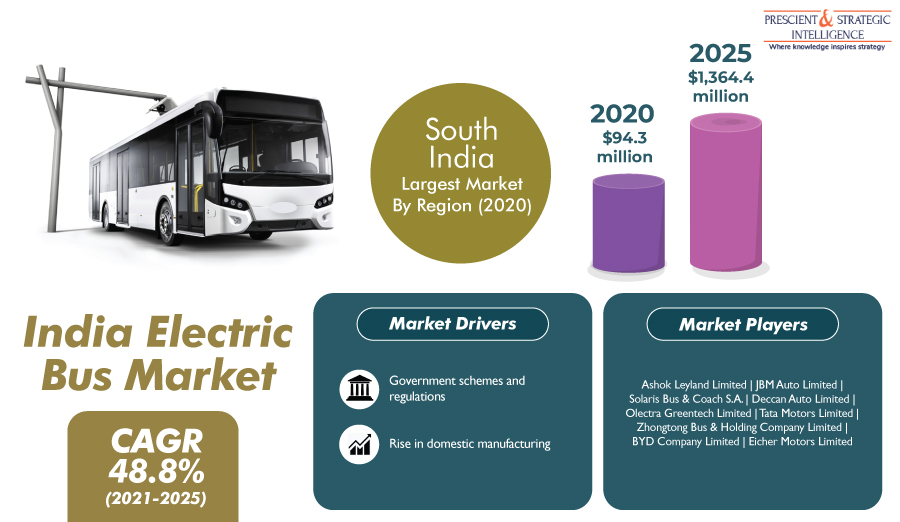With the rapid deterioration of the environment and the escalating air pollution levels, owing to the large-scale usage of oil and gas-powered vehicles, the Indian government is enacting policies for facilitating the adoption of electric vehicles, including electric buses, in the country. For instance, the Ministry of Heavy Industry and Public Enterprise announced the eligibility criteria for electric passenger vehicles, two- and three-wheelers, and buses, as per which, the manufacturers and buyers of these vehicles will be able to avail the various benefits of the FAME II (Faster Adoption and Manufacturing of (Hybrid &) Electric Vehicles in India) in March 2019.
Additionally, the government announced the plan for the deployment and procurement of 5,585 electric buses all over the country in August 2019, which when completed is predicted to result in savings of 1.2 billion liters of fuel. Besides these government initiatives, the surging manufacturing of electric buses is also expected to fuel the expansion of the Indian electric bus market in the coming years. Many local manufacturers are increasingly announcing collaborations with various foreign players for meeting the soaring requirement for electric buses in the country.
Request for sample pages of this report: https://www.psmarketresearch.com/market-analysis/india-electric-bus-market/report-sample
For example, GreenCell Mobility entered into a partnership with PMI Electro Mobility Solutions and intends to manufacture 350 electric buses in Uttar Pradesh in the coming years. This is expected to create 1,000 jobs in the country. Apart from these factors, the growing public awareness about the benefits of electric buses is also fueling the growth of the Indian electric bus market. Because of these factors, the revenue of the market is predicted to surge from $94.3 million in 2020 to $1,364.4 million by 2025, while the market will demonstrate a CAGR of 48.8% between 2021 and 2025 (forecast period).
Depending on type, the market is divided into hybrid electric bus (HEB) and battery electric bus (BEB) categories. Of these, the BEB category is predicted to dominate the market during the forecast period. This will be because of the higher adoption of these buses and the existence of suitable infrastructure for the manufacturing of these buses in the country. Additionally, the government is providing various incentives and subsidies for promoting the use of these environment-friendly buses.
Browse report with detailed COVID-19 impact analysis on Electric Bus Market in India Trends and Growth Forecast to 2025
In India, the sales of electric buses will surge at the fastest pace in the northern region in the coming years, as per the estimates of the market research company, P&S Intelligence. This is credited to the enactment of supportive policies regarding the deployment of electric buses in the region by both state and central governments. Furthermore, the implementation of strict emission norms and escalating air pollution levels are also propelling the advancement of the Indian electric bus market in the region.
Hence, it can be said without any doubt that the demand for electric buses will soar in India in the coming years, primarily because of the rising public awareness about the environmental degradation caused by the large-scale usage of oil and gas-powered buses and the implementation of favorable policies and provision of financial incentives by the government.
Market Size Breakdown by Segments
By Type
- Battery Electric Bus (BEB)
- Hybrid Electric Bus (HEB)
By Length
- Less than 10 m
- More than 10 m
By Battery
- Lithium–Iron–Phosphate (LFP)
- Lithium–Nickel–Manganese–Cobalt Oxide (NMC)
By Application
- Intercity
- Intracity
By Region
- South
- East
- West
- North
Browse Other Related Reports
Electric Bus Market – Globally, Asia-Pacific accounted for the largest share in the electric bus market in 2020, due to the presence of favorable government policies, such as tax rebates and discounts for replacing fossil fuel-driven buses with alternative fuel variants.
Electric Car Market in India – At the state level, Maharashtra generated the highest demand for electric cars in 2017, and it is expected to lead the Indian electric car market in coming years as well. This is due to the Electric Vehicle Policy 2018 of the state to support EV manufacturers and charging infrastructure developers, and offer subsidies on the purchase of electric cars to costumers.
Media Contact
Company Name: P&S Intelligence
Contact Person: Abhishek
Email: Send Email
Phone: +918887787886
Address:Noida Sector 2
City: Noida
State: UP
Country: India
Website: https://www.psmarketresearch.com/market-analysis/india-electric-bus-market

